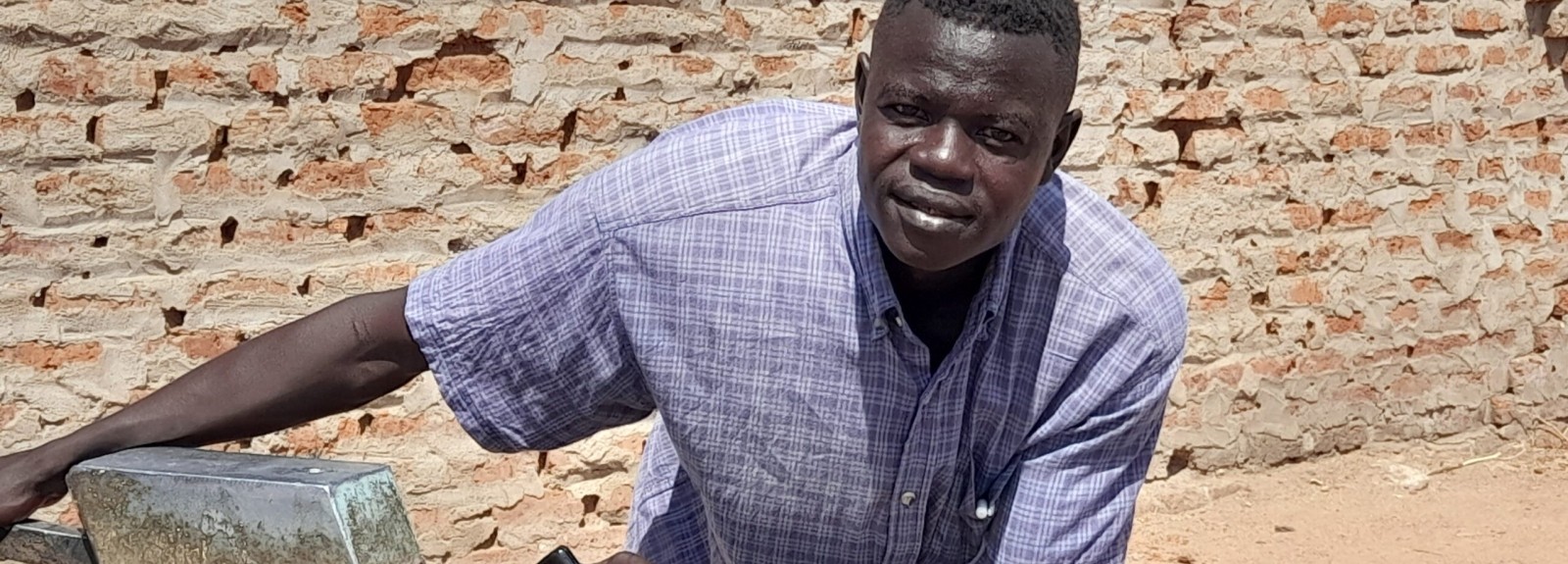In South Kordofan, Sudan, most of the existing water supply infrastructure is either broken or damaged. This is a result of decades of conflict in the region, a shortage of skilled personnel to perform routine maintenance and repair, and insufficient material resources necessary to make these repairs.
Mohammed Al-Mujtaba Kamal Mahdi, a 32-year-old father of four children, is a member of a “circuit rider” team in South Kordofan. Circuit riders are water system technicians responsible for regularly investigating and maintaining the community water supply infrastructure. They are supported by MOMENTUM Integrated Health Resilience, funded by the United States Agency for International Development (USAID) and led by Corus organization IMA World Health.
The recent conflict in the region has significantly hindered the circuit riders' ability to ensure clean water reaches communities. The conflict, which began in Sudan's capital, Khartoum on April 15, 2023, involving the Sudanese Armed Forces (SAF) and the Rapid Support Forces (RSF), has now expanded to other areas. This has led to the displacement of numerous civilians to South Kordofan and reignited conflict in June between the SAF and the Sudan People's Liberation Movement–North (SPLM-N) in and around Kadugli, the state capital. The localized conflict has forced people from the eastern and southeastern areas of Kadugli town to move to residential areas in the west, adding strain to the already overburdened water system infrastructure. This has resulted in conflicts over water resources. Additional challenges such as fuel shortages, lack of spare parts, and insufficient incentives for repair and monitoring activities have compounded the situation. Nevertheless, MOMENTUM Integrated Health Resilience collaborated with the Water and Environmental Sanitation project and the Sudanese Red Crescent to supply spare parts for repairing and maintaining non-operational hand pumps.
Mohammed and his circuit rider colleagues assessed three communities hosting internally displaced persons in Kadugli. The aim was to understand the gap between supply and demand and pinpoint water infrastructure in need of repair. The main challenge remains providing access to water, sanitation, and hygiene services and ensuring all community members have access to safe water sources. Currently, most residents rely on hand pumps for drinking water, which are insufficient to meet their needs. The assessment revealed that out of the 17 water sources evaluated, 10 had non-functional hand pumps, and two "water yards" required rehabilitation.
These findings highlight the scarcity of clean water in the area, with an estimated daily supply of less than seven liters per person, falling far below the World Health Organization's recommended standard of 50-100 liters. Beyond water supply concerns, rural areas face issues with poor hygiene practices. Lack of proper sanitation facilities leads to widespread open defecation, posing significant health risks such as water-borne diseases to the communities.
Circuit riders test the functionality of a water hand pump in Kadugli, South Kordofan.
To address some of the issues outlined in the assessment, MOMENTUM coordinated with the Water and Environmental Sanitation project, the Sudanese Red Crescent and UNICEF to obtain spare parts for the circuit rider team to repair the non-functioning pumps. Since the assessment, the circuit rider team (many of whom are from the affected communities) has repaired 16 hand pumps across six different communities. A total of 70,761 people had improved access to safe drinking water as a result.
Mohammed highlighted the significant impact of rehabilitating water supply systems on his community and neighboring areas. This effort has led to reduced conflicts over water and natural resources. Mohammed noted that:
MOMENTUM’s work, especially the circuit rider activity, has helped create social cohesion and promote peace between different communities by supporting our working together to increase everyone’s access to water. Now that our circuit rider team has become known and has a reputation, we have gotten requests for maintenance in other communities as well. Access to spare parts still poses a challenge, as they are non-existent in the local market. The other challenge is that we have not yet activated the community tariff collection system due to the current conditions and the failure to pay salaries and wages to civil service employees since last May.
The latter situation means that many community members have not been paid, leading to their inability to contribute tariffs in support of the circuit riders. Despite the ongoing conflict in Sudan and the structural challenges that have occurred as a result, MOMENTUM Integrated Health Resilience has helped to empower community members through education and training, exemplified by the circuit rider initiative. This approach enables community members to take ownership of improving the health and well-being of their community.
Fifteen-year-old resident Fatima concludes, “We are very appreciative of the efforts of the community circuit riders in maintaining the water system in our area. Thanks to their efforts, we have regular access to clean water closer to my home. In the past, it used to take long hours to fetch water, but now it takes me only a few minutes to get our daily needs. I have plenty of time to study and chat with my friends.”

